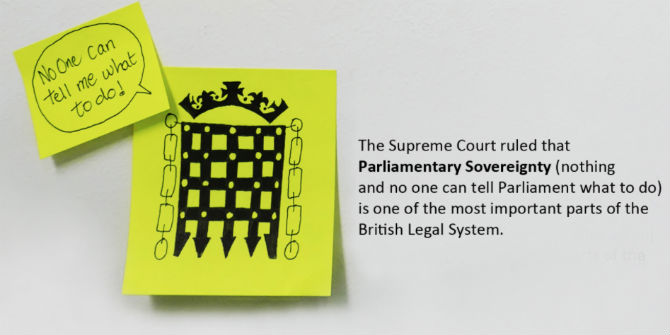There is no ‘anti-English’ sentiment in Ireland in the wake of Brexit. The success of Sinn Fein in the recent Irish general election was built on a deep-seated public dissatisfaction with the quality of social provision in health, housing, childcare and other ‘quality of life’ issues at a time of a booming economy. The party’s traditional nationalism is certainly an issue of concern, but it played simply no role in its electoral success, writes Ben Tonra (University College Dublin).
The curse of social science can be our pursuit of comparability. Every event of political significance must be immediately labelled. We reach unhesitatingly for well-established concepts that are within easy reach and which allow us to pop such events into its appropriate conceptual box. When you marry that overwhelming impulse with limited empirical knowledge and the need to publish something – anything – in short order, you get the kind of article published in The Atlantic on Ireland’s recent parliamentary elections.
The cardinal error of the article is to assert that Sinn Fein’s rise owes anything to a ‘nationalist moment.’ Not a scintilla of hard evidence is proffered to sustain the claim – largely because none exists – simply the assertion that Brexit has fomented ‘anti-English’ sentiment. The only informed analysis provided – by a fellow political scientists at Dublin City University and Technological University Dublin – underline the wholly marginal role nationalism played in the election. Yet that does not restrain an analysis which quantifies nationalist moments in the heretofore unknown measurement unit of ‘upticks’.
Brexit has been widely viewed in Ireland as a lamentable lapse of British (more particularly English) political and economic judgement which has the potential to impose serious and deleterious costs on the Irish economy and, much more dangerously, to threaten a fragile peace project on the island. That anxiety, however, was immediately translated into political agency as the state successfully marshalled the support of its 26 EU partners in defence of maintaining an open border on the island of Ireland. Tensions there were, moments of high drama too. But at no stage was ‘anti-English’ sentiment evident anywhere across the mainstream political spectrum – including Sinn Fein. Schadenfreude there was, frustration certainly and plenty of abject amazement. There was also on occasion real irritation as senior British Conservative politicians first dismissed and later traduced the concerns of border communities at the prospect of a reinforced border. Resentment too when many of the same politicians proposed ‘solutions’ for the border which had no basis in reality. At no time, however, was that anger directed at the ‘English’ or the UK per se – where many politicians and parties were stalwart advocates for Irish concerns.

For its part, Ireland’s diplomatic success created a frenzy of British tabloid vitriol fed from some quarters in the Conservative Party. Ireland was – at one and the same time – an unthinking pawn of Brussels determination to punish Britain for Brexit while also being a bitter nest of unreconstructed nationalists outbidding one another to leverage Brussels in pursuit of revanchist goals. The thought that a small state might successfully engage its EU partners in a shared endeavour to defend peace on the island could not apparently be accommodated in their mental universe.
Sinn Fein has very successfully (and much to its own surprise) capitalised on deep-seated public dissatisfaction with the quality of social provision in health, housing, childcare and other ‘quality of life’ issues at a time of a booming economy. That success was enabled by a conservative two-party duopoly (Fianna Fail and Fine Gael) seen as unresponsive to addressing those needs. Sinn Fein’s traditional nationalism is certainly an issue of concern – not least the impact any role for it in government may have on bilateral British-Irish relations; but it played simply no role in its electoral success. Indeed, both Fianna Fail and Fine Gael sought to stem the Sinn Fein tide late in the campaign precisely by referencing its past – with little evident success. For good or ill, the electorate, or at least a solid 25 percent of it, paid little or no attention to Sinn Fein’s nationalism. As copious poll data shows, voters were instead mesmerised by the prospect of real and substantial social change. In a large exit poll conducted on behalf of the national broadcaster and University College Dublin, what might be described as ‘nationalist issues’ did not even register. Immigration and Brexit itself, the closest possible proxies for nationalism, animated a grand total of 1 percent of voters. A ‘nationalist moment’ it most certainly was not.
This post represents the views of the author and not those of the Brexit blog, nor LSE. Image by Sinn Féin, Some rights reserved.







Just like there is no anti-Irish sentiment in England. Electing a terrorist party with blood on its hands is just callous disregard for the wider message that sends out across borders.
This is what Ben Tora wrote in 2018
“A particularly English class of political leaders, supremely well-trained in the art of political debate, strained at what they saw as the shackles of perennial European compromise. They longed for a return to a mythical past of global buccaneers and benevolent empire.”
But now he is complaining that
“Every event of political significance must be immediately labelled. We reach unhesitatingly for well-established concepts that are within easy reach and which allow us to pop such events into its appropriate conceptual box.”
Nice find, TeeJay! The words ‘professor’, ‘hoist’ and ‘petard’ spring to mind…
However, this time round, he’s broadly right. Sinn Fein are much less of a problem for the British than the SNP. Irish politics will be chaotic and unstable for quite some time to come, so no one will be able to do much of anything. We British went through all of that for 2½ miserable years until last December’s election.
The chaos of Irish politics is of a piece with France, Spain, Italy, Germany… the list of EU member states with stable politics grows smaller all the time. I suggest that this is because of the EU. In any regional grouping, the member states have to maintain the same set of policies for the grouping to survive. The region’s interests trump national interests. As the EU arrogates more and more power to itself, voters in the member states find that national elections decide less and less. They can vote until they are blue in the face, but nothing changes. So, in their frustration, they vote in increasing numbers for anyone outside the mainstream. I suggest that’s why Die Linke and AfD are both doing well in Germany.
If the besieged European elites remain fixed on ‘ever closer union’ as their objective, then political fragmentation will continue and worsen. This is political game that will end very badly.
“The chaos of Irish politics is of a piece with France, Spain, Italy, Germany… the list of EU member states with stable politics grows smaller all the time.” To be honest, German politics is so stable it is boring. I’ve read somewhere that Germany is one of the few countries where most politicians try to be boring.
“I suggest that’s why Die Linke and AfD are both doing well in Germany.”. There is a handy table of opinion poll results here
https://www.wahlrecht.de/umfragen/forsa.htm
The percentage of those expressing a preference saying that they would vote either Linke or AfD if there was a Bundestageswahl next Sunday was between 19% and 22% in the last 4 polls. This is enough to be worrying for the other parties, but it is not a huge percentage. It is also less than the 22.3% the two parties got in the Bundestagswahl in 2017, so I don’t see any signs of people “voting in increasing numbers for anyone outside the mainstream”.
If you look at the numbers, the big success story of the last 6 years has been the Green party, which has more than doubled its support. I’m not doing any detailed statistical analyses now, but it looks to me as if support for the Linke has remained about the same. The AfD has doubled its support like the Greens, but from a lower base, and has also moved far to the right during the refugee crisis in 2015. It increased its support when it did that, but has not made huge strides since. From the numbers, it’s not clear to me if AfD support is tending upwards in the long term, or if the days when they were polling 15 or 16% in July 2018 are definitively over.
There is a crisis in Thuringia, but that is only one of 16 Bundesländer. It is as dangerous to extrapolate Thuringian politics to the whole of Germany as it would be to extrapolate Scottish politics to the whole of the UK.
What sentiment regarding the ‘English’ is more relevant to reference Her Majesty’s Government (HMG) or Tories. widely discussed with astonishment were the comments by Priti Patel – starve them out; Gove – we can handle the Irish; johnson – why can’t they all be called Murphy; Unnamed – the Irish should know their place.
If anything these comments brought ot was resolve.
Reported also was the introduction of ‘Foot & Mouth’ disease from GB in recent years and also the cause of BSE in the 80’s aso from a relxation of UK rules on Bonemeal.
If anyone took the trouble, the leader of Sinn Fein went from being pilloried by the press to the recipient of praise as when compared with Johnson, and in particular Johnson, Arlene Foster, and Sammy WIlson she came across as statesman like. (On the subject of violence, Wilson was heard on BBC one morning stating that he ‘fought a terrorist war to protect the Union’).
I’m not an apologist for SF, and I cannot see how they can form and subist in a rainbow Government for any length of time, I also think (hope) that the figures are against them (37 to 81 is too great when compared with Fianna Fail 38 to 62 (with FG blocking SF).
the problem is that they don’t break ranks, and are well-informed politicians knowing the answers before they ask the question, if they don’t form a government, they will be the official opposition – where they will learn how ot be in Government, as they will receive briefings from Government which have been denied to them heretofore.